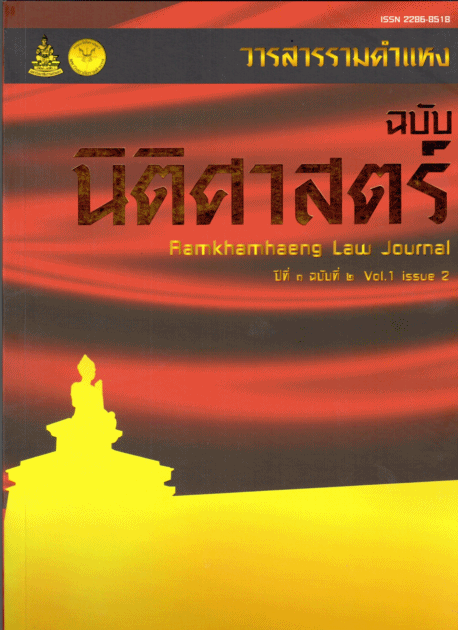ปัญหาการกระทำที่เป็นการขัดกันแห่งผลประโยชน์ของสมาชิกสภาผู้แทนราษฎรและสมาชิกวุฒิสภา: ศึกษากรณีตามมาตรา 265 รัฐธรรมนูญแห่งราชอาณาจักรไทย พุทธศักราช 2550
Main Article Content
Abstract
Abstract in Thai unavailable
Problems Concerning Actions Involving Conflicts of Interest of Members of the House of Representatives and Members of the Senate: A Case Study of Section 265, The Constitution of the Kingdom of Thailand, B.E. 2550
Actions involving conflicts of interest of members of the House of Representatives and members of the senate have been commonplace in the Kingdom of Thailand (Thailand) since time immemorial. Members of the House of Representatives and members of the senate have frequently acted in accordance with personal interests by illegitimately exercising the authority vested in them by virtue of the positions they have held. Unethical behaviors by those in positions of authority have unabatedly run rampant throughout the land for many decades. Apparently, such figures find no difficulty in electing to act in accordance with the dictates of personal benefit in spite of the fact that at the same time they are thereby acting contrary to the public interest. Even though there have been many attempts to rectify this unsavory situation through making changes in the legal system, problems continue to arise without surcease in this connection. In the case of Thailand, the researcher has studied the problems issuing from unlawful actions stemming from conflicts of interest.† It has become clear to the researcher that there are a number of shortcomings and inappropriate aspects when it comes to addressing and rectifying this problem in the Thai legal system. In this light, then, the researcher investigates problems involving conflicts of interest pursuant to members of the House of Representatives and members of the senate (members of parliament or MPs) in accordance with Section 265, The Constitution of the Kingdom of Thailand, B.E. 2550 (2007). Furthermore, on the basis of these studies, the researcher is now able to suggest how the Constitution should be amended such that it can more efficaciously address the problem of conflicts of interest. Findings are as follows: Firstly, there are no clear provisions stipulating the qualifications of those who would hold political positions as members of the House of Representatives or as members of the senate. Secondly, there are no clear provisions specifying how these provisions are to be combined with other provisions governing other actions in the course of direct or even indirect applications. Thirdly, there are no clear provisions regarding the holding of concessions, being a party to a contract, or a partner or shareholder. Fourthly, there are problems in the enforcement of prohibitions involving the spouses and children of MPs. Fifthly, there are problems in provisions that provide exceptions for those who are MPs.

